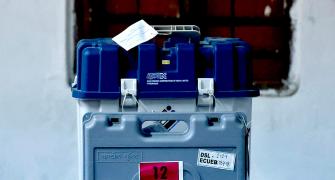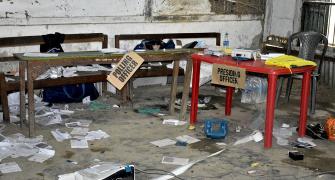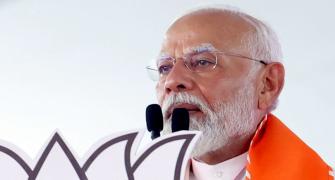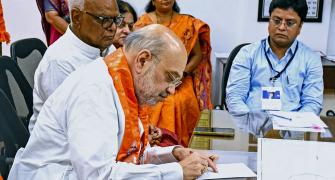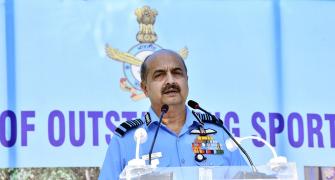The Indo-US nuclear deal is now being fast-tracked through the International Atomic Energy Agency, Nuclear Suppliers Group and America's Congress. There are, however, three further mutation points for the deal. At each point, the prime minister -- as he clearly pledged during the Lok Sabha debate on July 21 and 22 -- will have to bring the deal back to Parliament.
Stage 1: Once the IAEA safeguards agreement is approved by the agency's board of governors, it will come back to India with the blank annexure in the draft agreement filled up to reveal the specific nuclear reactors (out of a total of 22) which India has agreed to put under invasive IAEA inspections in perpetuity.
Stage 2: The US government will simultaneously seek and receive a clean, exemptions-free agreement for India from the NSG (which it founded). However, the IAEA safeguards draft agreement is itself invalid without 'additional arrangements of cooperation' (as mandated in the IAEA draft) signed with key NSG members. The IAEA safeguards agreement cannot be considered a complete document until these 'additional arrangements of cooperation' are drawn up. When they are, these too must come to Parliament for examination as they will specify the scope and strength of uranium fuel replacement guarantees in the event of a Pokhran 3 and the consequent (virtually) automatic termination of the parent 123 Agreement. The question MPs must ask: how legally enforceable are the NSG's fuel replacement guarantees?
Stage 3: The finalised IAEA, NSG and 123 agreements will be tabled in the US Senate and the House of Representatives for approval. This will be achieved swiftly since the Indo-US deal is part of America's relentless non-proliferation agenda. But at stage 3 too, as the PM has pledged, we will have the opportunity to examine all three agreements (IAEA Safeguards, NSG exemptions and the 123) before they are signed into law.
At this point, possibly around October-November 2008, and before the government finally signs the 123, the PM must address these six concerns:
1. Parliament should be allowed to examine the Additional Protocols that govern the IAEA safeguards agreement. The IAEA is an inspection agency. Its job by definition is invasive inspections of non-nuclear weapons states' reactors. Exactly how intrusive will these inspections be? Around 14 of India's 22 reactors are expected to come under inspection. Among the five nuclear weapons states' nuclear reactors, only a fraction are under IAEA inspection. India is of course being treated as a non-nuclear weapons state under the 123 Agreement. It is certainly not getting "a passport and visa to the nuclear club" as External Affairs Minister Pranab Mukherjee told the Lok Sabha on July 21, 2008. If anything, India is getting entry into the staff quarters of the nuclear club. The country must be made fully aware of this. If we eventually sign the 123, we must at least not be delusional about our future nuclear status.
2. Parliament must also examine the additional protocols governing the US-Chinese 123 Agreement. The public can then compare how "good a deal" India has really got, as the government says, on a clause-by-clause basis. An impartial examination could reveal that IAEA inspections of China's nuclear reactors are far less invasive than India's will be.
3. It is important to know from the government whether further explosive nuclear tests are necessary to maintain our minimum nuclear deterrent. The five nuclear weapons states continue testing ceaselessly through computer simulation. Can India? We need a clear, independently verifiable answer to this.
4. In the event of an underground N-test (by, for example, a future non-Congress coalition government), and the inevitable termination of the 123 by the US president, we need to know the safety measures the government is putting in place to ship back highly toxic processed uranium fuel to individual NSG member-states.
5. Since under the 123, India will -- as per the government's own projections -- generate just 800 MW a year incrementally (barely enough to light up South Mumbai), how will the deal give us energy security? A single proposed power plant like the Dadri project in UP will generate 3,740 MW, around a third of what all new nuclear plants under the 123 will generate together over the next 12 years (an estimated additional 10,000 MW) at a higher capital cost. Why are we being told that the 123 Agreement will light up India's 6,70,000 villages and deliver energy security when it clearly will not?
6. Parliament must know the specific dual-technology items India will receive after the 123 is signed. Since the US-led "international community" imposed unjust economic and technological sanctions on India after both 1974 (Pokhran I) and 1998 (Pokhran II), India's GDP growth has according to the government itself been curtailed. Should India not seek financial compensation for the illegal sanctions imposed upon it? After all, as a non-signatory of the NPT, India broke no international law by testing nuclear weapons.
Now that the United Progressive Alliance coalition has nine months in office, it must be transparent and accountable to those who pay and elect it to serve the people of India. A single mis-step on the 123 could irreparably damage rather than advance India's national interest. That would prove costly with a general election right round the corner.
(The author is the biographer of Rajiv Gandhi and Aditya Birla)


